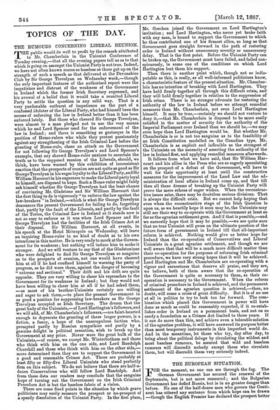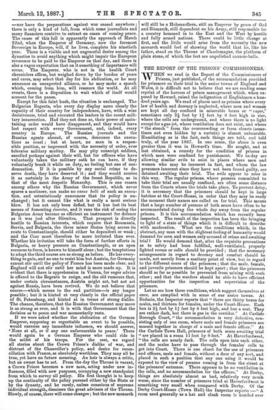THE EUROPEAN SITUATION.
FOR the moment, no one can see through the fog. The -German Government has secured the renewal of the Septennate, but is not more reassured ; and the Bulgarian Government has defied Russia, but is in no greater danger than before. No one of the half-dozen men who govern the Conti- nent has uttered any sentence from which hope can. be drawn —though the English Premier has declared the prospect better
—nor have the preparations against war ceased anywhere ; there is only a kind of lull, from which some journalists and many financiers contrive to extract an omen of coming peace. The cause of this lull is apparently the approach of March 22nd, when the Emperor of Germany, now the foremost Sovereign in Europe, will, if he lives, complete his ninetieth year. There is a visible and not ungraceful desire among the dynasties to avoid anything which might impair the European reverence to be paid to the Emperor on that day, and there is also a vague expectation that on it something of importance will occur. The Emperor, who is not in the health Court chroniclers affirm, but weighed down by the burden of years and cares, may select that day for his abdication, or he may announce an unexpected alliance, or he may make a speech which, coming from him, will reassure the world. At all events, there is a disposition to wait which of itself would account for the pause.
Except for this faint hush, the situation is unchanged. The Bulgarian Regents, who every day display more clearly the capacity of their country for independence, have, with a wise decisiveness, tried and executed the leaders in the recent mili- tary insurrection. Had they not done so, their power of main- taining order would have disappeared, and they would have lost respect with every Government, and, indeed, every country in Europe. The Russian journals and the Russian agents abroad, of course, denounce the execu- tions as cruel ; but at heart, no man in a respon- sible position, or impressed with the necessity of order, ever tolerates military mutiny. He may pity conscript soldiers, enrolled perhaps against their will, but for officers who have voluntarily taken the military oath he can have, if they voluntarily break it while on duty, no feeling but one of con- demnation. If it is possible by any social crime to de- serve death, they have deserved it ; and they would receive it as certainly in the Army of the freest Republic, as in that of the most despotic Monarchy. This is one reason among others why the Russian Government, which never spares a mutineer, can make no cases Belli of such an execu- tion, and ostentatiously announces that its policy is un- changed; but it cannot like what is really a moat serious blow. It has not only been defied, but it has lost its best means of fomenting e'meutes, and it runs the risk of seeing the Bulgarian Army become as efficient an instrument for defence as it was just after Slivnitza. That prospect is directly hostile to Russian interests, which require that Roumania, Servia, and Bulgaria, the three minor States lying across its route to Constantinople, should either be dependent or weak ; and the Czar must therefore be more irritated than ever. Whether his irritation will take the form of further efforts in Bulgaria, or heavy pressure on Constantinople, or an open recourse to force, is known to himself alone ; but the temptations to adopt the third course are as strong as before. He has every- thing to gain, and no one to resist him but Austria, for Germany cannot stir until the policy of France has been made clear, and England will not stir until her mind is more made up. It is evident that there is apprehension in Vienna, for eager advice is offered to the Regents to resign, and the old rumours that, under certain circumstances, Austria might act, but not act against Russia, have been revived. We do not believe that course—which means in the end partition—is any longer possible ; but it is hinted at very clearly in the official paper of St. Petersburg, and hinted at in terms of strong dislike. The chance, therefore, that the Russian Government may move is as strong as ever, and it is with that Government that the decision as to peace and war momentarily rests.
If we were asked whether the abdication of the German Emperor, supposing so regrettable an event to be possible, would exercise any immediate influence, we should answer, None at all, or if any one unfavourable to peace.' There would again be a German Emperor who could ride in the midst of his troops. For the rest, we regard all stories about the Crown Prince's dislike of war, and distrust of the Chancellor's policy, and desire for recon- ciliation with France, as absolutely worthless. They may all be true, yet have no future meaning. An heir is always a critic, but an owner has to act. From the day the Throne is vacant,
a Crown Prince becomes a new man, acting under new in-
fluences, filled with new purposes, occupying a new standpoint from which to survey all policy. His first thought is to keep. up the continuity of the policy pursued either by the State or by the dynasty, and he rarely, unless conscious of supreme individual strength, dismisses the great advisers of the Throne. Slowly, of course, there will come changes ; but the new monarch will still be a Hohenzollern, still an Emperor by grace of Gad and Bismarck, still dependent on his Army, still responsible for a country hemmed in to the East and the West by hostile and fully armed nations. There could be little change at first, and the little would arise from the necessity the new monarch would feel of showing the world that he, like his father, stood on the Throne of Charlemagne, the platform of plain stone, of which the feet are unpolished cannon-balls.



































 Previous page
Previous page